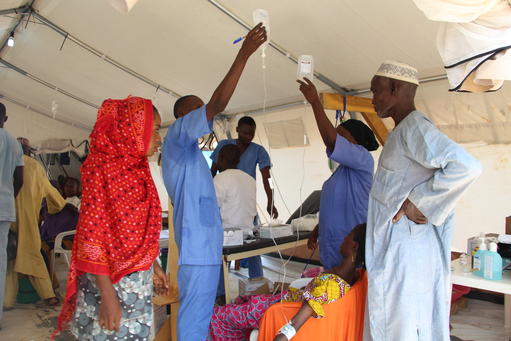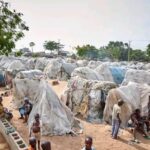Barely two weeks after Borno declared a cholera outbreak, neighbouring Yobe state has declared its own epidemic of cholera.
At least 3,126 cases have been recorded across both states—and 97 people have died.
A total of 989 infections recorded across five local government areas of Yobe are thought to be cholera. Sixty-one deaths have been reported there by September 20, according to the United Nations Office for Coordination of Humanitarian Affairs.
The UN agency says a lack of communication networks and poor accessibility to some affected local government areas remain a problem, especially in Gulani and Gubja.

“Health partners and community mobilisers have visited thousands of households in both states in recent days as part of the active case search, to encourage individuals with cholera-like symptoms to be screened,” it said.
The group, Doctors Without Borders (MSF), has set up a 34-bed centre to treat cholera at the General Hospital in Damaturu. The centre could expand by another 50 beds, the group said.
Another 20-bed treatment centre is sited in Damagun, with an additional 10 points for oral rehydration across Damaturu and Shanka wards of Fune council area.
The group said it is working with the state health ministry and other non-governmental organisations to identify additional areas of response to meet the needs of local communities.

Over the last two months, Borno state has been receiving heavy amounts of rainfall, which creates the ideal circumstances for cholera to spread.
“With so much rain and the subsequent increase of water in communities, it is very easy for water supplies to become contaminated,” said Lou Cormack, MSF field coordinator at the treatment centre in Dala.
“That is why it is more important than ever that people practice good hygiene, ensuring that they always wash their hands with soap after using the bathroom and before preparing or eating food, and that the water they drink or cook with is clean.”

Typically, symptoms of cholera appear within a few hours to five days after infection. A cholera infection is often mild or without symptoms but sometimes can be severe, resulting in profuse watery diarrhoea and vomiting.
“Sufferers rapidly lose body fluids, leading to dehydration and shock. Without treatment, they may die within hours. As such, it is essential that anyone who suspects that they or family member may be suffering from Cholera goes immediately for rehydration treatment at their nearest oral rehydration point, medical centre or ideally, Cholera Treatment Centre/Unit. People who seek medical care as early as possible have a very good chance of survival,” concludes Cormack.

 Join Daily Trust WhatsApp Community For Quick Access To News and Happenings Around You.
Join Daily Trust WhatsApp Community For Quick Access To News and Happenings Around You.

